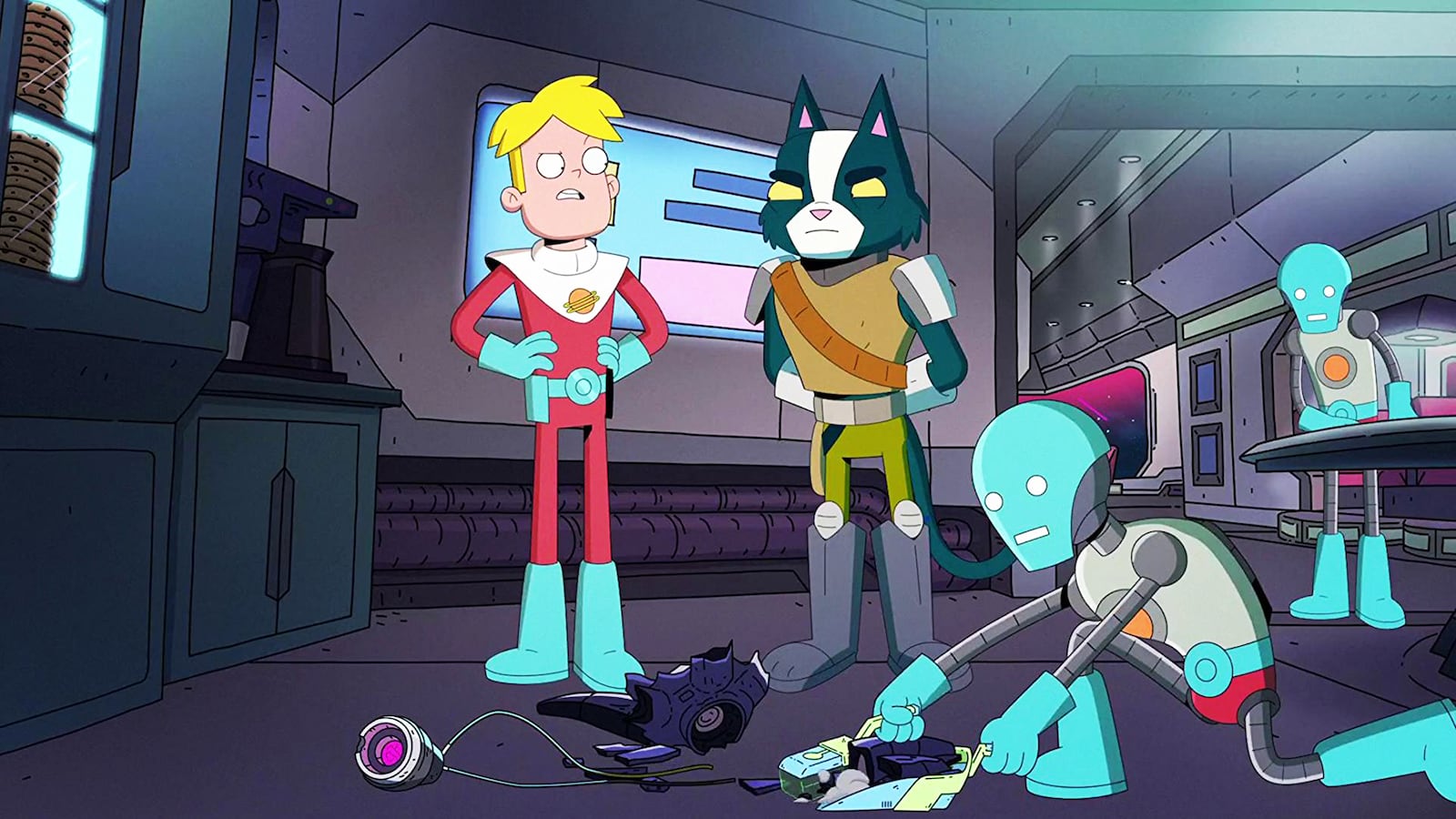Even if the name Olan Rogers doesn’t ring a bell, if you’ve spent any time on the internet over the past few years, you’ve probably seen his face. His YouTube channel has close to a million subscribers, and his videos are popular to the point that they’ve been mined for reaction images and GIFs. His latest project is considerably larger in scale, though it still bears the signs, good and bad, of that more short-form medium.
Final Space, airing on TBS and executive produced by Conan O’Brien, is an animated sci-fi comedy. Like most TV shows, it falls prey to the rule of “give it a few episodes and then it’ll get good,” but it’s charmingly animated and bite-sized to boot (each episode clocks in at just over 20 minutes), so it’s worth sitting through the shaky opening episodes to get to what lies beyond.
Rogers stars as Gary, a human serving out a five-year prison sentence on board a spaceship, kept company by just the ship’s AI, HUE (Tom Kenny), a robot named KVN (Fred Armisen), and a handful of crew bots. It’s a lonely existence, and it seems to be driving Gary a little crazy—that is, until he encounters a little green alien while performing some repairs on the ship. It’s a cute, friendly blob (also voiced by Rogers), and as most randomly encountered things in space are, it’s also a world of trouble. Though it looks harmless, it has the power to destroy planets, and there are some very nasty folks looking to harness that power for themselves.
The big bad in question is known only as the Lord Commander (David Tennant), a diminutive alien with supernatural abilities looking to tear through the fabric of the universe to reach the “Final Space” of the series’ title. If he manages it, he’ll effectively destroy the universe. Tennant is terrific—and aurally unrecognizable—as are Tika Sumpter as Quinn, the woman after whom Gary’s been pining, and Coty Galloway and Steven Yeun as Avocato and Little Cato, a father and son duo ripped apart by galactic turmoil.
Galloway and Yeun are the best things about the series, with Galloway’s performance in particular perfectly walking the line between comedy and drama. As the show develops, it slips from straight sci-fi comedy into more emotionally heavy territory (the evolution of Adventure Time comes to mind in this respect), and Avocato serves as the best anchor for that change. This is especially impressive given the way the show seems structured to thread its secondary characters in and out: Avocato (who is, it should be noted, an anthropomorphic cat alien) makes enough of an impact to last.
For the most part, that cycling is something that the show does well. The only bad thing about it is that it emphasizes the fact that Gary is not quite the strongest character in the show. This is where Final Space falters—its humor seems stuck in the era of early Flash videos like “Badger Badger Badger,” largely with Gary as a mouthpiece; or, perhaps more accurately, it’s stuck in the kind of humor that works in YouTube videos (the name “Avocato” should indicate as much), but isn’t necessarily enough to sustain an entire show. Gary’s delusions of grandeur and accordingly juvenile behavior aren’t particularly compelling, either, and his obsession with Quinn is made difficult to root for when it quickly becomes apparent that he’s only really interacted with her for a minute at most. Though they barely know each other, he sends her a video message from space jail almost every day. This isn’t appealing behavior in 2018, let alone in the distant future.
Luckily, there’s enough good stuff packed into the show to power past its more regressive qualities. It’s notably dark, with characters routinely being subjected to violence that sits starkly against the relatively simple graphic style of the rest of the show, and explorations into the traumas of childhood are organically integrated into the plot instead of just being dropped into the show for the sake of drama. It also works in medias res, opening as Gary floats through space, running out of oxygen and utterly alone. Each episode begins with a glimpse of Gary’s worsening predicament before throwing the viewer back into the narrative that (presumably) leads up to it. It’s a gambit that raises the stakes: We’re not assured of a happy ending, and Final Space very quickly takes measures to make sure that we don’t expect one, either.
The built-in cliffhanger also ensures that there’s another hook to keep watching the show beyond the lovely visuals and the voice performances, which is something of a blessing as Final Space feels like it has the potential to grow into something on the level of Adventure Time or Bojack Horseman given the time and opportunity. Space is endless, and the possibilities for Final Space feel that way, too. And besides, the level of talent featured on the show (Ron Perlman, Gina Torres, and Keith David also pop in to lend their voices to characters) literally speaks for itself.
That said, promise doesn’t necessarily guarantee payoff, and Final Space could just as easily falter as it could flourish. It’s an easy watch if that’s what you’re looking for, but if you’re looking for something with a point—or the next great animated series—it might be worth holding off to see how things play out. It’s not quite a must-watch just yet, though one hopes it eventually will be.





